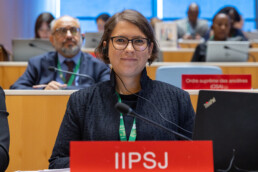Blog Post: IIPSJ Attendance at the 66th World Intellectual Property Organization General Assemblies
(WIPO GA) (Geneva, 8-17 July 2025)
By Dr. Metka Potočnik (she/her/hers), Senior Lecturer in Law, Wolverhampton Law School
IIPSJ attended the 66th World Intellectual Property Organization (WIPO) General Assemblies (GA), in their capacity as the WIPO Accredited Observer. Now attending in person for the third year in a row, IIPSJ participated in the official hearings at the WIPO Headquarters in Geneva, with the Associate Director for International Programmes, Dr Metka Potočnik, attending the length of the proceedings in person. These assemblies brought together another record number of delegates (over 1,600), from 194 Member States. All sessions are available for viewing here. The opening address of the Director General Tang, can be found here.
IIPSJ attended the GA sessions for the third time in Geneva, after having observed several WIPO meetings online, since 2020. IIPSJ continues to take the GA meetings as an opportunity to build strategic partnerships with Member States and other stakeholders, interested in creating access, inclusion and empowerment for under-represented creators and innovators in the global eco-system. IIPSJ contributed to the discussion in writing (contact us for the full statement, which will be included in the GA report), and in the session (view here, at 00:43:51, or here).
The content of our statement, in particular our emphasis of the UN Sustainable Development Goals, was also reflected in the discussions among Member States during the Programme and Budget Committee. What we have seen since the beginning of 2025 is a change in the context of discussions at WIPO, especially Agenda #11 (see here). Among other proposals, the United States asked for the “Removal of all references to the 2030 Agenda for Sustainable Development and SDGs from the Proposed Program of Work and Budget for 2026/2027” (A/66/7, page 11, Agenda #9, paragraph 3(i), see here), together with a reduction, or deletion of the Development Acceleration Fund. After two weeks of informal negotiations, all Member States approved the PBC on Thursday, 17 July 2025 (final day), without the deletion of the UN SDGs from the Proposed Program of Work and Budget for the upcoming biennial. The US delegation did not want to stand in the way of adopting the PBC by consensus but put their strong objections to WIPO’s continued references to the implementation of the UN SDGs, across their work and programmes on the record.
IIPSJ representative, Dr Metka Potočnik, also attended the 12th WIPO-NGO Stakeholder Dialogue, which was organised in parallel with the 66th WIPO GA and took place on Friday, 11 July 2025, at the WIPO New Building. WIPO Director General Darren Tang, Assistant Director Edward Kwakwa and Assistant Director General Andrew Staines, and other WIPO experts met with sixty-eight Accredited Observers and NGOs “to exchange views and strengthen engagement with the global intellectual property (IP) system.” According to DG Tang, when counting the Observers as well, the number rises to 1,800 delegates of the 66th GA session. The event has been placed in the spotlight for its importance and more can be read here.
WIPO also launched its Institutional Capacity Framework (ICF), which will be ‘a health check tool’ for universities and research institutions, aimed at fostering innovation. ADG Marco Aleman acknowledged that universities and research institutions are environments where innovation happens. Research organisations will be able to use ICF (on voluntary basis) to create growth, facilitate policymaking and build dialogue. Professor Fazilet Vardar introduced the ICF in more detail. ICF combines Knowledge and Technology (K/TT) Metrics to assess seven core capability dimensions: (1) leadership and governance, (2) organisational capacity, (3) institutional culture, (4) infrastructure, (5) transfer mechanisms, (6) stakeholder engagement, and (7) monitoring and learning. The tool will be general in nature and include research from all fields (STEM, social sciences, or the arts) and aims to cover the needs from organisations, which are only starting in research, and the needs of larger universities, well-established in world-leading research. The tool is still under development and its publication still pending. If you are with a research institution or a university and want to help WIPO develop the ICF (either at the stage of proof of concept by the end of 2025, or in the pilot stage, taking place in early 2026), please do get in touch with us, and we will connect you with the relevant WIPO team.
IIPSJ is continues to contribute to future discussions in WIPO, with the aim of building a more inclusive WIPO eco-system. The IIPSJ team are working towards a meaningful participation in the 47th Session of the Standing Committee on Copyright and Related Rights (SCCRR) (see here, 2026 dates to be confirmed) and the 35th Session of the Committee on Development and Intellectual Property (CDIP) (see here). Going forward, the IIPSJ also plans to expand its activities to the work of the Advisory Committee on Enforcement (ACE) (see here), in particular in the field of IP arbitration and mediation. If you are interested in contributing to IIPSJ work in this space, do contact the IIPSJ directly.
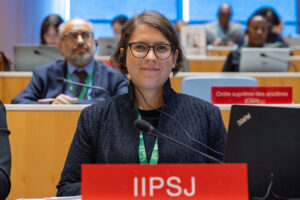
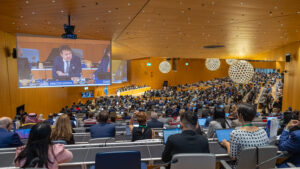
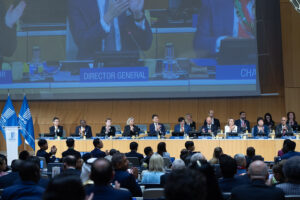
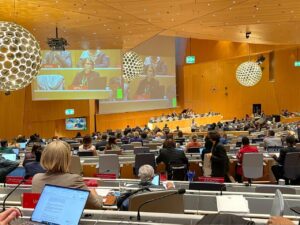
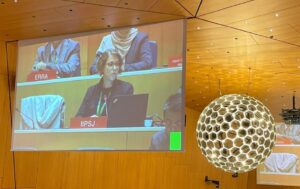
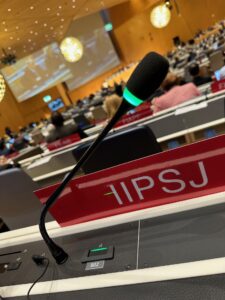
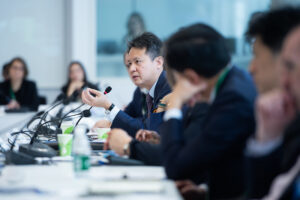
Blog Post: Call for Book Chapter Proposals
A New Book on IP and Social Justice:
Call for Chapter Proposals
Lateef Mtima, Kara Swanson, Trevor Reed, Eds.
Intellectual property legal theorists, pundits, and policy makers increasingly embrace the proposition that IP protection not only supports producer incentives and creative and innovative benefits typically within the commercial sphere. IP protection can also be construed and implemented to produce outcomes that promote social justice. In this vein, a collection of international IP scholars, policy makers, and practitioners collaborated in the recent publication of The Cambridge Handbook of Intellectual Property and Social Justice, which volume undertakes to articulate a discrete theory of IP Social Justice and to explore some of the social benefits that might be gained through its application to the IP ecosystem.
Whereas the Cambridge IP SJ Handbook demonstrates how a social justice approach to IP protection can expand the social capability of the IP legal regime, the anthology further engenders the consideration of a broader, sequential question: beyond supplementing traditional IP theories and rationales, to what extent might IP SJ supplant such prevailing perspectives, towards greater fulfillment of the social function of IP protection to promote human development and wellbeing? As a follow up to the IP SJ Handbook, a new volume will explore this and related questions.
Call for Book Chapter Proposals
Through this call for book chapter proposals, we invite submissions that
(A) consider, compare, contrast, and/or critique the tenets of IP SJ (i) in the context of traditional IP theoretical rationales, such as economic utility, natural rights, and human rights law; and/or (ii) in the context of non-traditional IP theoretical rationales, such as decolonial theory, feminist theory, queer theory, and critical legal/critical race theory.
(B) explore how IP SJ theory might be applied to address specific contemporary IP challenges, particularly those which the prevailing IP rationales have so far proven incapable of addressing, including problems such as addressing TKCE achievement, AI technologies, global warming issues, and other current IP-related concerns.
This call for chapter proposals is intentionally international in scope, both with respect to subject matter and contributors. Prospective contributors are encouraged to contemplate the global future of IP law and policy, whether from the perspective of reinforcement and reform or of revolution and deconstruction, although proposals that use a specific country or region to illuminate the topic would be welcomed. Proposal abstracts should be no more than 250 words in length and submitted by September 1, 2025; for accepted abstracts, the deadline for submitting preliminary chapter drafts of at least 3,000 words (but no more than 10,000 words including footnotes) is December 1, 2025, whereafter contributing authors will be invited to participate in an in-person/hybrid roundtable workshop to discuss drafts. The editors anticipate that final drafts will be limited to 5,000-8,000 words including footnotes and will be due no later than July 1, 2026. Publication of the volume is projected for Fall 2026.
Proposal abstracts or questions should be sent to Victoria Fisher at Victoria.Fisher@iipsj.org.

